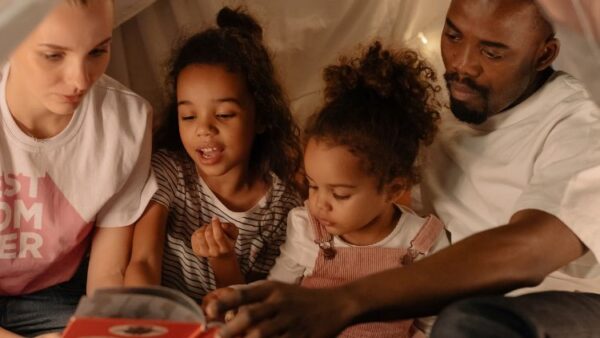Are the differences in parenting styles ruining your marriage? Learn how to agree on parenting styles when they clash!
Are you and your partner stuck in a never-ending battle over parenting styles? You know, those moments when you feel like you’re speaking completely different languages when it comes to raising your little ones? Well, fret not! In this article, we’re diving headfirst into the world of parenting dynamics and how they can either make or break your relationship. From understanding the challenges faced by couples with differing parenting styles to learning effective communication strategies and finding that elusive common ground, we’re here to guide you on how to agree on parenting styles, despite your differences.
But that’s not all! We’ll also be exploring the importance of seeking professional support, implementing consistent parenting strategies, and reigniting that spark in your relationship that might have gotten a little dim amidst the chaos of parenting.
By the end of this read, you’ll be armed with the tools and insights you need to navigate the tricky terrain of differing parenting styles and emerge stronger, both as loving partners and as nurturing parents.

Understanding Different Parenting Styles
We all know that no two people are exactly alike, and that goes for parenting styles too. You might be more of a laid-back “let them explore” type while your partner is the “safety first” kind of parent. When parenting styles clash, it can feel like you’re speaking different languages, right?
Understanding each other’s parenting styles is key. Take a moment to recognize that both of you want what’s best for your little ones, even if you’re taking different routes to get there. By appreciating the underlying intentions and values behind your approaches, you can start to bridge the gap and find a common ground that benefits both your marriage and your kids.
Remember, it’s all about teamwork and finding that sweet spot where your parenting styles can complement each other, creating a balanced and nurturing environment for your children.
Can a Marriage Survive Different Parenting Styles?
Alright, let’s talk real talk. Given the importance of marriage, we encourage making the effort to work out your differences when parenting styles clash. You might wonder, “Can our marriage weather the storm of different parenting styles?” Well, here’s the scoop: it’s not always easy, but it’s possible.
Differences in parenting styles can sometimes feel like a whirlwind tearing through your relationship. But take heart! Many couples have navigated these choppy waters and come out stronger on the other side.
The secret sauce? Communication and compromise. Yep, that’s the magic combo. Open up those lines of communication, really listen to each other’s perspectives, and be ready to meet in the middle. It’s all about finding that sweet spot where you can blend your approaches and create a united front for the sake of your family.
Remember, at the end of the day, your love for each other and your kids is what matters most. With patience, understanding, and a dash of flexibility, you can ride out the storm and come out stronger as a team.
Challenges Faced By Couples With Different Parenting Styles
So, you’re not the only ones facing this challenge. When it comes to raising kids, mismatched parenting styles can sometimes feel like navigating a maze blindfolded. The struggles are real, and it’s okay to acknowledge that. Here are some of the specific challenges you might be up against:
- The classic clash of values: Your partner might swear by structure and discipline, while you lean towards a more relaxed and easygoing approach. It’s like trying to mix oil and water, right?
- The good old tug-of-war over decision-making: You want to encourage risk-taking, while your spouse is all about playing it safe. It’s enough to make you feel like you’re stuck in a never-ending game of “who’s right.”
- Pressure from the outside world: Cue the judgments from relatives, friends, or even the ever-present social media, all bombarding you with their “expert” opinions on what you should or shouldn’t be doing.
- The toll it takes on your relationship: Constant disagreements and misunderstandings can chip away at the foundation of your marriage, leaving you both feeling frustrated and disconnected.
But hey, take a deep breath. You’re not alone in this. Understanding the challenges is the first step toward overcoming them, and trust me, there are ways to work through these hurdles and emerge even stronger as a couple and as parents.
How to Deal With Different Parenting Styles in Marriage
Alright, let’s get down to business. Managing different parenting styles in your marriage might seem like a tall order, but fear not, there’s light at the end of the tunnel. Here’s how you can start bridging the gap and finding that sweet spot:
1. Communication Strategies for Resolving Parenting Conflicts: Sit down, grab a cup of coffee (or tea, if that’s your jam), and have an honest heart-to-heart. Listen to each other without interruptions, and aim to understand rather than just waiting to defend your position.
2. Finding Common Ground in Parenting: It’s all about compromise, folks. Identify areas where your parenting styles can intersect. Maybe you both value education, creativity, or simply making sure the little ones feel loved and secure.
3. Seeking Professional Support and Mediation: There’s no shame in seeking a little outside help. A counselor or therapist can provide a neutral perspective and offer valuable insights on how to navigate your differences more effectively.
4. Implementing Consistent Parenting Strategies: Consistency is key, my friends. Once you’ve agreed on a certain approach, stick with it. Children thrive on predictability, and a consistent approach can help create a stable and nurturing environment for them.
5. Rebuilding and Strengthening Marital Bonds: Don’t let the parenting struggles overshadow your love for each other. Make time for date nights, and heart-to-heart conversations that aren’t about the kids, and remember why you fell in love in the first place. A strong marital bond can serve as the foundation for overcoming any parenting obstacles.
Remember, it’s a journey, not a race. By taking small steps every day, you can create a harmonious balance that benefits both your marriage and your kids.
Communication Strategies for Resolving Parenting Conflicts
Let’s tackle those parenting conflicts head-on. Communication is the golden ticket here, but it’s not just about talking. It’s about listening, understanding, and finding that middle ground. Here are some nifty strategies to get those conversations flowing smoothly:
1. The Power of Active Listening: It’s not just nodding and waiting for your turn to speak. Practice active listening by paraphrasing what your partner says and showing genuine interest in their perspective. Trust me, it works wonders.
2. Stay Calm, Stay Respectful: Yeah, we know it’s not always easy, especially when you’re knee-deep in a disagreement. But keeping your cool and showing respect, even when you disagree, sets a positive tone for the conversation.
3. Use “I” Statements: Avoid pointing fingers and placing blame. Express your feelings and concerns using “I” statements. For example, “I feel worried when…” or “I think we could try…”
4. Schedule Regular Check-Ins: Don’t let the communication fall by the wayside. Set aside regular times to discuss your parenting approach, check how things are going, and make any necessary adjustments. Consistency is key, remember?
5. Acknowledge Each Other’s Strengths: You both bring something valuable to the parenting table. Acknowledge and appreciate each other’s strengths, and let that recognition be the foundation for your communication.
Remember, it’s not about winning the argument; it’s about understanding each other’s perspectives and finding solutions that work for your family as a whole.
Finding Common Ground in Mismatched Parenting Styles
There’s a sunny patch ahead where you can find common ground and build a unified approach. Here’s how to find that sweet spot:
1. Identify Shared Values: Take a moment to pinpoint the values that matter most to both of you. Whether it’s instilling kindness, independence, or a love for learning, finding those shared values forms the basis of your common ground.
2. Focus on the Big Picture: Zoom out for a moment and look at the bigger picture. What kind of adults do you want your kids to become? Keeping this shared vision in mind can help guide your parenting decisions and bring your perspectives closer together.
3. Embrace Compromise: It’s the magic ingredient, folks. Be ready to meet in the middle, blending your different styles to create a balanced approach. Compromise doesn’t mean giving up your beliefs; it means finding a way to honor both your perspectives.
4. Celebrate Each Other’s Strengths: You’re a team, remember? Celebrate each other’s strengths in parenting. Maybe one of you is great at nurturing emotional intelligence, while the other excels at fostering independence. Embrace these differences as complementary assets.
5. Learn From Each Other: Take this as an opportunity for growth. Be open to learning from each other’s parenting styles. You might be surprised at how much you can broaden your approach by incorporating elements from your partner’s style.
Remember, finding common ground isn’t about losing your identity as a parent; it’s about creating a beautiful blend that enriches your children’s lives and strengthens your bond as a couple.
Seeking Professional Support and Mediation
Sometimes, navigating the twists and turns of different parenting styles can feel like you need a superhero’s guidance. That’s where the professionals swoop in to save the day. Here’s how seeking their support can be a game-changer:
1. Reach Out to a Family Therapist or Counselor: Don’t be shy to seek guidance from a professional. A family therapist or counselor can offer a neutral perspective and provide you with effective strategies to navigate your parenting differences more smoothly.
2. Consider Parenting Workshops or Seminars: These workshops aren’t just for new parents! They can be a goldmine of tips and insights on effective parenting strategies. Plus, attending them together can be a bonding experience in itself.
3. Connect with Support Groups: Knowing you’re not alone in this can be a tremendous relief. Joining a support group of other parents who have faced similar challenges can provide you with a sense of community and valuable advice from those who’ve been there.
4. Embrace Mediation Services: When the going gets tough, a mediator can help facilitate productive discussions and guide you both toward finding common ground. They’re like the referees of the parenting game, ensuring fair play and effective communication.
5. Keep an Open Mind: Remember, seeking professional support isn’t a sign of weakness; it’s a proactive step towards strengthening your family’s dynamics. Approach it with an open mind and a willingness to learn and grow.
Together, with the support of these professionals, you can navigate the challenging terrain of different parenting styles and emerge stronger and more united than ever.
Implementing Consistent Parenting Strategies
When it comes to raising little humans, consistency is your secret weapon. It might sound like a daunting task but fear not, with a bit of teamwork and some clever strategies, you can make it happen. Here’s how:
1. Unified Front, Always: Present a united front to your kids. This means discussing your approach beforehand and agreeing on decisions together. When they see that you’re on the same page, it can create a sense of stability and security for them.
2. Stick to the Plan: Consistency is key, folks. Once you’ve decided on a parenting approach, stick to it as much as possible. Of course, flexibility is important, but maintaining consistency in your expectations and consequences can help your kids understand boundaries and feel secure.
3. Communication is Key, Again: Keep those lines of communication open, not just between the two of you, but also with your kids. Explain the rules, their purpose, and the consequences of breaking them. Clear communication can prevent misunderstandings and confusion.
4. Lead by Example: Children are sponges, absorbing everything around them. Be the role model you want them to follow. If you expect them to be respectful, show them what respect looks like in your daily interactions.
5. Patience is a Virtue: Rome wasn’t built in a day, and neither are consistent parenting habits. It takes time, patience, and plenty of practice. Don’t be too hard on yourselves; every small step you take towards consistency counts.
By implementing these consistent parenting strategies, you’re not just providing your children with a stable environment, but also fostering their growth and development in a way that’s nurturing and dependable.
Rebuilding and Strengthening Marital Bonds
Amidst the beautiful chaos of parenting, it’s crucial not to lose sight of the foundation of it all – your relationship. Remember, you were partners before you became parents. Here’s how you can keep that flame burning bright:
1. Carve Out Quality Couple Time: Yes, we know the schedule is jam-packed with soccer practices, playdates, and bedtime stories. But make it a point to carve out quality time for just the two of you. It could be a weekly date night, a morning coffee together, or even a simple walk in the park. These moments are the glue that keeps your bond strong.
2. Rediscover Each Other’s Hobbies: Remember those hobbies you used to enjoy before the pitter-patter of little feet? Rediscover them together. Whether it’s painting, hiking, or trying out a new recipe, reignite the spark by sharing these activities and creating new memories.
3. Open Up, Don’t Bottle Up: Parenthood can be overwhelming, and it’s easy to get lost in the whirlwind of responsibilities. Take the time to talk to each other about your feelings, your fears, and your joys. Keeping those lines of communication open can deepen your understanding of each other and strengthen your connection.
4. Appreciate Each Other’s Efforts: Don’t let the little things go unnoticed. Appreciate each other’s efforts, whether it’s a home-cooked meal, a heartfelt gesture, or simply being there when the other needs support. Expressing gratitude can go a long way in nurturing your bond.
5. Laugh Together, Often: Laughter truly is the best medicine, especially in the challenging world of parenting. Find humor in the chaos, share jokes, and don’t be afraid to be silly. Laughing together can lighten the mood and remind you both of the joy that brought you together in the first place.
By prioritizing your relationship and nurturing your bond, you create a strong foundation for your family and set a beautiful example for your children about what love and partnership truly mean.
How to Agree on Parenting Styles
So, you and your partner might not always see eye to eye when it comes to parenting. Guess what? You’re not alone. Here are some strategies to help you find common ground and bridge the gap:
1. Acknowledge and Respect Differences: Recognize that both of you come from a place of love and care for your children. Respect each other’s viewpoints and understand that diverse parenting styles can complement each other.
2. Focus on the End Goal: Keep your ultimate parenting goals in mind. Whether it’s raising independent, kind, or resilient children, remembering these shared aspirations can guide your decision-making and bring you closer together.
3. Experiment and Evaluate Together: Try out different approaches and observe how they impact your children. Reflect on what works and what doesn’t, and use these insights to shape a unified approach that incorporates the best of both your styles.
4. Compromise with Open Communication: Make room for compromise. Have open and honest conversations, expressing your concerns and priorities. Work towards finding solutions that combine elements of both your parenting styles.
5. Learn and Grow Together: Parenting is a journey of constant learning. Embrace this journey together, seeking out new information and adapting your parenting techniques as you go. Attend parenting workshops, read books, and consult trusted resources to broaden your understanding and reach a consensus.
Remember, the beauty of parenting lies in its diversity. By respecting each other’s perspectives, focusing on shared goals, and fostering open communication, you can navigate the parenting maze as a team, building a nurturing and loving environment for your little ones.
Remember that parenting is a journey filled with twists and turns, but it’s also a beautiful adventure that you and your partner are undertaking together. By understanding each other’s perspectives, communicating openly, and embracing the art of compromise, you can create a harmonious balance that nurtures your kids and strengthens the bond between you and your significant other.
And hey, if you’re looking for some extra support on this exciting journey, here are a few resources worth checking out:
- “The Whole-Brain Child” by Daniel J. Siegel and Tina Payne Bryson is a fantastic read on cultivating a deeper connection with your child.
- “Parenting from the Inside Out” by Daniel J. Siegel and Mary Hartzell offers valuable insights on understanding your parenting style.
- “Positive Parenting Program (Triple P),” an evidence-based program that provides practical strategies for navigating challenging parenting situations.
Remember, you’re not alone on this adventure, and with the right tools and a lot of love, you’ve got this!
Articles In Our Parenting Styles Series
- 4 Parenting Styles & What They Mean for Your Family
- Why Are Parenting Styles Important?
- How to Agree on Parenting Styles When Your Differences Hurt Your Marriage
- The More Children You Have, The More Your Parenting Style Changes
- Top Tips to Help You Change Your Parenting Style

